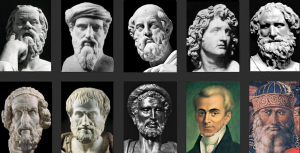
Philosopher (7th century BC)
Epimenides was a seer, a mystic, a prophet and a spiritual teacher of the early 7th century BC from Knossos of Crete. He excelled both as a lawmaker and a poet and is regarded as one of the most important representatives of Orphic theology and philosophy. Many aspects of Epimenides’ life and work remain either obscure or have been blended with myth.
Ancient accounts of Epimenides describe him as the prime practitioner of the “cathartic arts”, meaning a form of healing or cleansing of the soul. He possessed the ability, through theurgical rituals to cleanse physical and psychic miasmas, something referred to as Psychurgy.
Epimenides was a student of Pythagoras, whom he met when Pythagoras travelled to Crete in search of the initiates of Morgos. Epimenides took him to the Diktaean Cave where he performed him a spiritual cleansing and initiated him to the local Mysteries. In another account, when the city of Athens was plagued by an epidemic, the people sought help from the Oracle of Delphi, which told them to refer to Epimenides. When Epimenides came to Athens, he performed rituals to appease the Gods as well as to cleanse the city.
He is the author of multiple treatises on chresmos, instructions on cathartic and purification practices, on theurgy and rituals, each based upon the teachings of Orphic theology. Moreover, Epimenides wrote a Theogony although it is unknown to which extent it was similar to that of Hesiod. Together with Melampous and Onomacritus they form the triad of primary representatives of the Orphic Mysteries and was responsible for establishing the Eleusinian Mysteries and the Mysteries of Samothrace.
Epimenides is said to have slept in a cave for 57 years and that he died at the age of 154 or 299. Many Greeks accepted him as a favourite of the Gods as they believed that during his slumber he had communication with the Gods. From this myth came the expression Epimenidean Sleep, used when someone sleeps for extremely long time. In another myth, Epimenides is said to have advised Solon on the lawmaking of Athens. He was considered as the seventh of the Seven Sages of ancient Greece by some, instead of Periander. To him are attributed several quotes, the most famous one being the Epimenidean paradox «Κρῆτες ἀεὶ ψεῦσται» (Cretans always lie), since he himself was a Cretan.
Bibliography:
- Επιμενίδης, ο μάντης από την Κρήτη που κοιμήθηκε σε μια σπηλιά για 57 ολόκληρα χρόνια. Γιατί οι Έλληνες τον θεώρησαν αγαπημένο των θεών και μπήκε στον κατάλογο των επτά σοφών στη θέση του Περίανδρου… Μηχανή του Χρόνου. Mixanitouxronou.gr. Retreived on May 25, 2019. Web.
- “Epimenides”. Helios New Encyclopaedic Dictionary. Passas, I. Athens: 1946. Print.
- Σακελλαρίου, Γεώργιος. Πυθαγόρας Ο Διδάσκαλος τῶν Αἰώνων. Ἰδεοθέατρον. Ἀθῆναι: 1963. Print.
- Γράβιγγερ, Πέτρος. Ὁ Πυθαγόρας καὶ ἡ Μυστικὴ Διδασκαλία τοῦ Πυθαγορισμοῦ. Ιδεοθέατρον Διμελῆ. Ἀθῆναι: 1998. Print.

I do like an epimenderian sleep on a regular basis;)
LikeLiked by 1 person